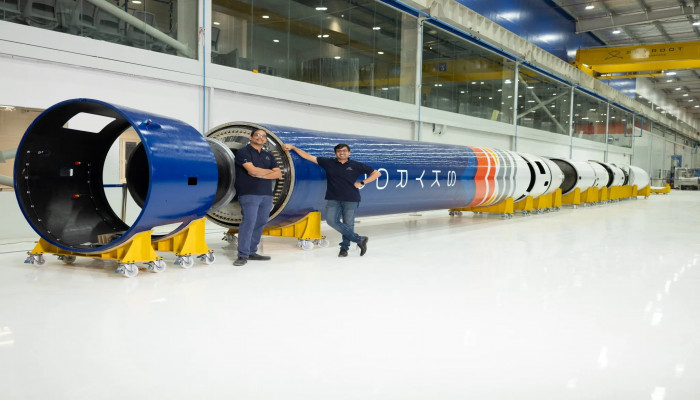Skyroot unveils Vikram-1 rocket for early 2024 satellite launches to low earth orbit
- In Reports
- 01:36 PM, Oct 25, 2023
- Myind Staff
The Spacetech startup Skyroot Aerospace is known for the historic feat of launching India's maiden privately constructed rocket, Vikram-S, into space last year. The company is now preparing to initiate its first orbital space launch vehicle mission in the first quarter of 2024.
A Hyderabad-based startup introduced Vikram-1, a seven-storey, multi-stage launch vehicle with a payload capacity of approximately 300 kg. This rocket possesses the capability to deploy satellites into the lower Earth orbit (LEO).
Notably, Vikram-1 stands as India's pioneering rocket constructed entirely from carbon fibre. It also features 3D-printed liquid engines, a technological innovation shared by Pawan Kumar Chandana, the co-founder and CEO of Skyroot.
The initial mission involving Vikram-1 is set to be partially commercial in nature. However, this maiden mission will be followed by three to four more Vikram-1 mission over the next eighteen months, paving the way for Skyroot's full-scale commercial operations.
Established in 2018 by two former ISRO scientists, Skyroot has garnered a substantial investment of 526 crores to date. The company is currently gearing up to secure additional funding through a forthcoming bridging round. Notably, Skyroot recently inaugurated India's largest private integrated rocket development facility, which operates within a single, expansive workspace.
The newly established facility, spanning an extensive 60,000 square feet, occupies a strategic location adjacent to the Rajiv Gandhi International Airport in Shamshabad. This facility is purpose-built to house Skyroot's fully integrated design, manufacturing, and testing capabilities for rocket production. It is equipped to accommodate approximately 300 employees to support these operations.
In addition to its operational functions, this site is designated as the official headquarters of Skyroot, named "MAX-Q." The name, MAX-Q, symbolizes the maximum stress that a rocket must withstand during its voyage into space, emphasizing the critical role of this facility in rocket development and the company's mission.
Indian space startup Skyroot Aerospace has introduced the Vikram-1 rocket, slated for a satellite launch mission to low Earth orbit in early 2024. The rocket named in honour of Vikram Sarabhai, a pioneer of India's space program, stands as a multi-stage launch vehicle with a payload capacity of approximately 300 kg. It distinguishes itself with 3D-printed liquid engines and a construction entirely crafted from carbon fibre.
Skyroot Aerospace's overarching mission is to deliver cost-effective rockets tailored to specific requirements, positioning itself as a source of inspiration for India's burgeoning talent pool. Additionally, the company has officially inaugurated its headquarters, known as The MAX-Q Campus, marking a significant step in its quest to advance the realm of space technology.
"Every rocket, during its travel to space, has to push through a point of maximum stress called 'Max-Q'. Our MAX-Q headquarters serves as a powerful symbol of our unwavering commitment to pushing boundaries and accomplishing the extraordinary, all in pursuit of our mission to Open Space For All," Pawan Chandana, co-founder and CEO of Skyroot Aerospace said.
"Skyroot is not only an example of India's superlative talent and scientific acumen but it also has a message for all of us that a huge potential was lying dormant for several decades before Prime Minister Narendra Modi came and broke the taboos of the past and opened India's Space Sector for Public Private Partnership (PPP)," Singh said.
Bharath Daka, Co-Founder and COO of Skyroot expressed immense pride in the simultaneous debut of the Vikram-1 space launch vehicle and the inauguration of the company's new headquarters.
"Our design prowess and cutting-edge home-grown technology have been integral to the creation of Vikram-1. As we eagerly prepare for the early 2024 launch, we will keep sharing further updates on the orbital mission with Vikram-1," Daka said.
Image source: Times of India







Comments